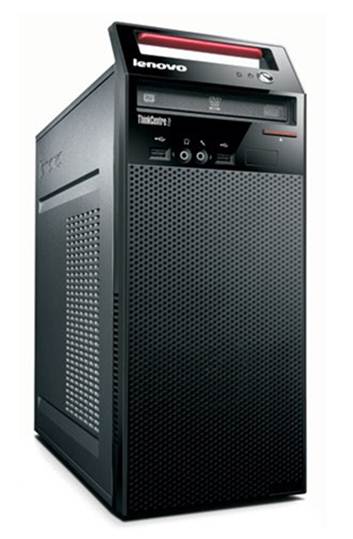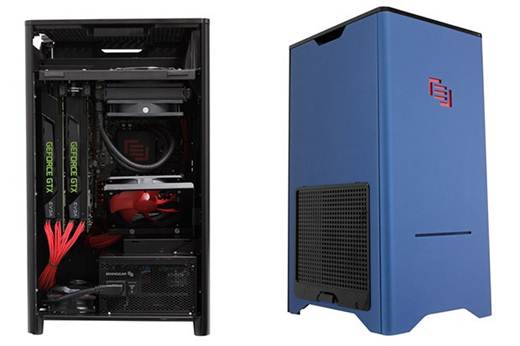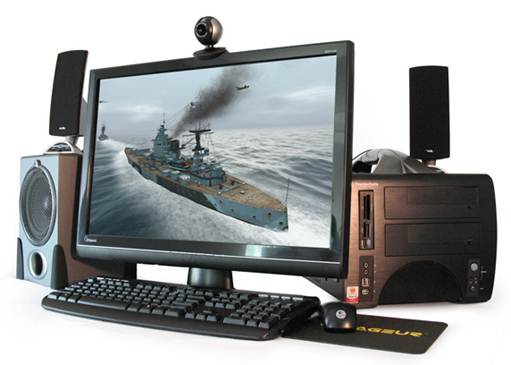What Technology Should You Look For?
Desktop systems are about two main things:
power and versatility, so you need to pay particular attention to the hardware
you look for in order to end up with a system that achieves these qualities.
For desktops in particular, make sure the
CPU is an Intel model unless you have a good reason for buying AMD. Intel’s
chips perform far better (particularly for intensive uses, such as gaming) and
even in their slower varieties will leave you better scope for upgrading. We’d
suggest buying an Ivy Bridge Core i5 if you’re aiming for a formidable machine,
but even Pentiums and Celerons hold their own to an extent.

Lenovo
ThinkCentre Edge family
A concern unique to desktop systems is what
type of screen they come with (if any). Any entertainment PC should have a
screen with a native resolution of 1920 x 1080, but the size in inches is down
to whatever you can afford as long as that’s taken care of. We think 24” is a
reasonable size, but if you want/prefer a larger or smaller one, there’s no
inherent problem with that it’s all about the underlying technologies. Do read
up on the model of monitor that’s on offer, though. It’s reasonably easy for
companies to fob you off with a cheap, low quality monitor and make it look
like a good deal, so check how it performs on its own, and if you wouldn’t buy
it as a standalone piece, don’t let them include it in your system package.
Expansion cards are also worth paying
attention to. Gaming PCs should, under all circumstances, include some kind of
graphics card. It doesn’t necessarily matter whether it’s an AMD or Nvidia
model, but their importance to gaming cannot be overstated. If you’re not
gaming, though, it’s largely safe not to have one especially if you’re running
a Sandy/Ivy Bridge system, which will contain the platform’s own entirely
reasonable GPU.

NVIDIA
launches GeForce 650 Ti, Maingear says all custom desktop models now have it
As for other expansions, if you want to run
your system as a home cinema, remember to get a sound card so that you can get
the most out of features like surround sound, and if you have a home network, a
wireless card is worth including. They cost very little, but they’re noticeably
better than USB dongles.
Remember that most websites will give you
some ability to customise the components and peripherals that make up your new
system, so take full advantage of that to make sure you get what you want and
don’t waste money on extras you don’t need.
Is Now The Right Time To Buy?
There’s no question that desktop systems
have fallen out of favour with the general public, and people are more likely
to buy tablets or laptop systems. It’s understandable: they’re simply more
convenient to have around the home.
As a result, the price of desktop systems
has plateaued at a low point. In that sense, buying now is as good a time as
any, because they can pretty much only get more expensive.
However, there are other reasons that now
would be a good time to buy a desktop systems. The first is that retailers tend
to refresh them alongside major releases in particular, operating systems and
CPU platforms. Windows 8 has just been released, and the successor to Ivy
Bridge isn’t due until late next year but both have been around long enough
that you won’t be paying a huge premium to own them.
The suggestion is clear: now would be a
reasonable time to buy a Desktop. Your other option is to wait just under a
year and hope to benefit from a price drop just before the release of the new
Intel platform, or wait just over a year and buy a new system at a premium, but
with the latest hardware. Since the trade-offs cancel each other out, you might
as well just buy a system now. There’s plenty of life left in Ivy Bridge, and
they’re still practically giving Windows 8 away for its introductory period, so
the longer you wait, the more chance there is that things will change and not
necessarily for the better.
What Are The Technical Constraints?
The biggest thing that sets desktop systems
apart from most other forms of computing is the obvious one: desktop systems
aren’t portable. Sure, you CAN lug them from room to room (if you have an hour
free), but it’s hardly worth it. Desktops are built to be static.
This means that they also take up a lot of
space (compared to portable systems, at least) and use a lot of power. After
all, with an unlimited supply of mains electricity, there’s little incentive to
dial it back at any point. Whether you’d consider these constraints is
debatable they’re more like the unavoidable consequences of what desktop systems
are good at, which is power hungry performance and space hungry range of
capabilities.

What
Are The Technical Constraints?
One thing that’s definitely a constraint on
desktop use is the maintenance they must undergo. Temperature regulation is a
big part of it desktop systems collect a lot of dust that needs cleaning out
from time to time (we’d suggest once a year or so) to prevent them overheating
and losing performance. Similarly, more powerful desktop components are more
susceptible to wear caused by higher temperature operations.
Once you have those covered, though,
there’s no reason running a desktop can’t be a simple process, even if it’s one
that requires a sliver more thought than running a portable system but hey, at
least you don’t have to worry about keeping desktops charged up!
|
What’s The
Alternative?
Desktop systems are largely built for
purposes that require somewhat grand capabilities, and that tends to mean
entertainment both gaming and home theatre based. If you can’t afford, or
don’t want, a desktop system, there are other options.
For example, if you don’t mind paying a
few hundred pounds more than a new desktop would cost you, it’s possible to
buy an Ultrabook laptop with similar specs and capabilities, but with the
advantage of being slightly more portable. Although notebook PCs tend to be
mid-field in terms of power, high-end Ultrabooks can compete on most levels
with a decent desktop system.
The problem is that they can’t be
upgraded easily (you’re largely stuck with whatever hardware is installed
when you buy it) and they’re not very good value if you don’t plan to utilise
their mobile features. That said, they do hold their secondary value far
longer than desktops, so in that sense they’re a smarter investment.
If you’re hoping to use a desktop system
as an entertainment machine for things like Blu-ray movies and video on
demand services, you could instead hook a home theatre PC up to your TV.
These systems are optimised for playing and storing video, which means that
they’re quiet and not very powerful, but they also contain things like a
hardware sound card that’ll give you better surround sound than any laptop.
If you want something that can play
games, DVDs AND connect to online streaming services, it’s worth pointing out
that most games consoles can do this for the princely sum of just over a
hundred pounds. Far cheaper than any desktop system. Though admittedly,
they’re exponentially less versatile as well!
|